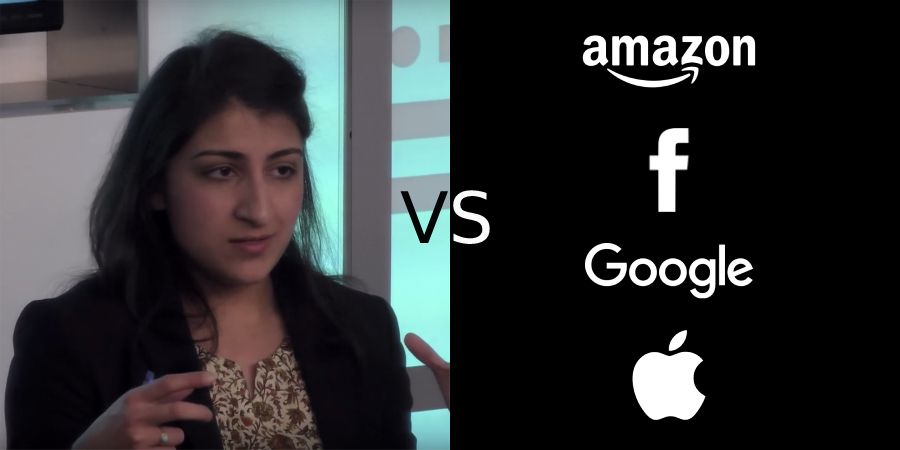Pictured above is Lina Khan, speaking on a panel about Amazon and antritrust law in 2016. The Columbia Law School Professor has been named chair of the FTC by the Biden Administration. Hours earlier, Khan was confirmed as commissioner of the FTC by the Senate. If there were any questions about the Biden administration's position on big tech, the appointment of Khan will have answered them. Khan has been a long-time critic of big tech companies and believes that they should be broken up into different businesses.
What is the FTC?
FTC stands for Federal Trade Commission. The FTC is an independent agency of the US Government. Founded in 1914 by former President Woodrow Wilson, consumer protection is part of the FTC's mandate. Their main mission is the enforcement of US anti-trust law. Over the past few years, the agency has received a lot of criticism for not effectively addressing privacy violations and anti-competitive practices by big tech firms like Amazon, Google, Facebook, and Apple. The agency has been on the receiving end of increased pressure from both political parties to reign in tech companies. Addressing the dominants positions of these firms is one of the few bipartisan issues that the US Congress seems to be able to work on. Lawmakers have also raised concerns over the years that the FTC is under-funded, under-resourced, and does not have the required technical expertise to effectively perform its functions.
Who is Lina Khan?
Lina Khan is an American legal scholar. She specializes in antitrust and competition law in the United States. Born in London in 1989, she moved to the United States at the age of 11. While studying law at Yale university Khan published an article in the Yale Law Journal titled 'Amazon's Antitrust Paradox. In the article, Khan argued that the current framework of antitrust laws could not address the anticompetitive effects of platform-based business models like that of Amazon. Her article had a lot of impact on American legal and business circles and ignited fresh discussions on what constituted a monopoly and how the law should approach it. Khan went on to join the Columbia Law School as an academic fellow and continued her research on antitrust law. She published a piece titled 'The Separation of Platforms and Commerce' in the Columbia Law Review. In the piece, she makes the argument that there should be structural separations that prohibit dominant intermediaries from entering a line of business that would place them in direct competition with other businesses that rely on their networks. An example of such a scenario would be Google and Apple. Both companies have their own app stores i.e platforms. And both companies also offer their own applications that are in direct competition with applications from other businesses. For example, Spotify is a competitor of Apple's and Google Music Apps, or Apple's Air Tags are direct competition for Tile, which is also available on Apple's app store. This creates an incentive for Apple and Google, who own the platforms, to promote their own products over the competition.
Why are big-tech companies nervous?
Big tech companies have been facing increased criticism over the past two years regarding their dominant positions and anti-competitive practices. Governments have been introducing new regulations to help govern these firms. Recently US lawmakers introduced 5 sweeping bills in congress that would fundamentally change how these businesses operate. The bills particularly target Facebook, Amazon, Google, and Apple. These bills purport to do what Khan has been proposing for years. Hence, tech companies are nervous as the agency in charge of enforcing antitrust laws will now be chaired and run by a vocal critic who supports the breaking up of big tech companies. You can read our full coverage of congress's 5 tech bills here.
The FTC also has the power to prevent companies from acquiring competitors or small companies that might one day grow into competitors. For example, it could stop Facebook from acquiring the next potential Instagram. Or prevent Twitter from acquiring Clubhouse. There is currently an ongoing antitrust lawsuit against Facebook, that Khan would now preside over. Facebook has been accused of copying, acquiring, and killing off its rivals. The lawsuit would play a key role in establishing precedent and be a strong indicator of the government's ability to police big tech companies.
Regulations passed in the United States could also lead to similar legislation in other parts of the world. For instance, after the EU passed GDPR, similar legislation was passed in Australia and Brazil. The EU is also considering its own legislation to create fair competition in the tech industry. The EU is currently evaluating the Digital Markets Act and the Digital Services Act, legislation that would restrict anticompetitive behavior by big tech companies and protect consumer choice.
The argument against breaking up big tech companies
How exactly to regulate big tech companies is a complicated matter. One that is challenging for even experts to address. Those in favor of big tech firms believe that the current legislation being proposed is an overreach and would damage the US economy. It would make it harder for Americans to access technology that Americans have gotten used to getting for free like Email and Social Media. Pro-tech supporters argue that regulating big-tech companies could have unintended consequences that would harm American consumers. Concerns have also been raised about the ability of these companies to continue maintaining security on their platforms if the proposed legislation is passed. For instance, Apple has raised concerns that sideloading of apps on iOS would lead to security vulnerabilities and an increase in malware.
Subscribe to whitepapers.online to learn more about the latest updates and news that impact the world of tech.
Featured image: New America, CC BY 3.0 <https://creativecommons.org/licenses/by/3.0>, via Wikimedia Commons

